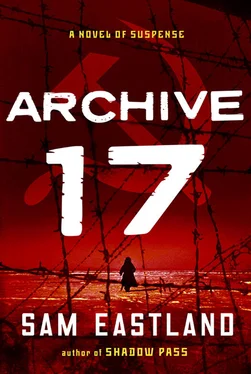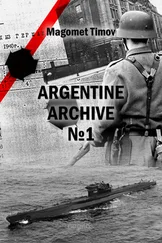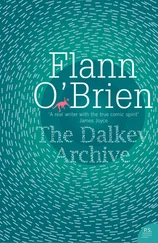Sam Eastland - Archive 17
Здесь есть возможность читать онлайн «Sam Eastland - Archive 17» весь текст электронной книги совершенно бесплатно (целиком полную версию без сокращений). В некоторых случаях можно слушать аудио, скачать через торрент в формате fb2 и присутствует краткое содержание. Жанр: Исторический детектив, на английском языке. Описание произведения, (предисловие) а так же отзывы посетителей доступны на портале библиотеки ЛибКат.
- Название:Archive 17
- Автор:
- Жанр:
- Год:неизвестен
- ISBN:нет данных
- Рейтинг книги:3 / 5. Голосов: 1
-
Избранное:Добавить в избранное
- Отзывы:
-
Ваша оценка:
- 60
- 1
- 2
- 3
- 4
- 5
Archive 17: краткое содержание, описание и аннотация
Предлагаем к чтению аннотацию, описание, краткое содержание или предисловие (зависит от того, что написал сам автор книги «Archive 17»). Если вы не нашли необходимую информацию о книге — напишите в комментариях, мы постараемся отыскать её.
Archive 17 — читать онлайн бесплатно полную книгу (весь текст) целиком
Ниже представлен текст книги, разбитый по страницам. Система сохранения места последней прочитанной страницы, позволяет с удобством читать онлайн бесплатно книгу «Archive 17», без необходимости каждый раз заново искать на чём Вы остановились. Поставьте закладку, и сможете в любой момент перейти на страницу, на которой закончили чтение.
Интервал:
Закладка:
Gramotin’s face showed a mixture of anger and disgust. He could not make up his mind whether to be angry at the man who had murdered Platov or disgusted at Platov for dying. He rested his hand on Platov’s shoulder, as if to offer consolation.
Unbalanced by the weight of Gramotin’s touch, the corpse keeled over on its side.
Gramotin picked up the rifle, sliding the bayonet out of Platov’s neck. He cleaned the blade by wiping it on the dead man’s coat, then shouldered the weapon and made his way to the commandant’s office.
Gramotin knocked on the door, slamming his fist against the flimsy wooden panels. There was no reply. Gramotin tried the handle, but it was locked. Already out of patience, he raised one boot and kicked in the door.
The first thing Gramotin saw when he walked in was a splatter of blood on the wall. The room smelled of gun smoke. Then he caught sight of Klenovkin’s body, lying stretched out on the floor behind his desk. The pistol was still in his hand. It was obvious that Klenovkin had shot himself.
Gramotin thought he knew the reason why. Lying on Klenovkin’s desk was the empty file belonging to prisoner 4745.
“Pekkala,” muttered Gramotin. He turned his head and spat onto the floor.
He was aware that the convict had escaped, having witnessed it with his own eyes. When the attack began, Gramotin had been up in one of the guard towers. Stepping out onto the walkway, he spotted Pekkala running towards the gates. He raised his rifle and fired at the running man. The first shot missed, which did not surprise Gramotin, since he was a poor shot even on his best days, but the second time he had Pekkala square in his sights. Before he had time to shoot, a bullet had come out of nowhere and struck the butt of his rifle, knocking him off his feet. Gramotin slipped off the walkway and fell into the ditch below. Landing in a dirty heap of snow, he had not suffered any injury, but by the time he crawled out of the ditch, Pekkala and the Comitati were gone.
Since the Comitati had never before attempted to escape, Gramotin immediately reached the conclusion that Pekkala must have engineered the breakout. To cover his tracks, the convict had even gone so far as to break into Klenovkin’s office in order to steal his own file. Having discovered this, Klenovkin must have realized that the blame would fall on him. In desperation, the man had taken his own life.
Now Klenovkin would have to be replaced-the very thing Gramotin had been desperate to avoid.
Melekov had botched his attempt to kill Pekkala.
Klenovkin, too, had bungled.
Even Stalin’s orders from Moscow had failed to end the bastard’s life.
I will have to do the job myself, thought Gramotin. He turned to leave, but then turned back. Bending down, he prised the pistol from Klenovkin’s hand, tucked it into his belt, and strode out of the room.
Kirov arrived at the Kremlin.
The message had said it was urgent.
A guard escorted him to Stalin’s office.
As the outer door opened, Poskrebyshev rose to his feet, with a particular casualness he reserved for men of lesser rank than the generals who usually paraded past his desk on their way to meet with Stalin. “He is expecting you, Major.”
“Thank you,” replied Kirov, handing Poskrebyshev his cap.
“I will require your passbook as well, Major.”
Kirov removed the booklet from the top left pocket of his tunic and placed it on the desk.
Poskrebyshev nodded towards the double doors which led into Stalin’s office. “Now you can go in.”
Stalin was sitting at a table just to the side of the main window, eating a tin of sardines in tomato sauce. The smell of them filled the air, metallic and vinegary. The lid of the sardine tin had been peeled back. It looked like a clock spring, the little key still jutting from the center of the coil. With blunt fingers, Stalin chased the slippery and headless fish out of the sauce and packed them into his mouth.
Kirov waited in silence, his eyes fixed on Stalin’s jaw muscles, which flexed beneath the pockmarked skin.
Stalin sucked the oily fish scales from his fingertips. Then he wiped his hands on a brightly patterned handkerchief which lay across his knee. “Do you know why I sent Pekkala to Siberia?”
“To investigate the murder of Captain Ryabov.”
Stalin picked a fishbone from between his teeth. “And do you know why I took such an interest in the death of this convict?”
“He was a member of the Kolchak Expedition.”
“Correct.”
“I also know that you believed there might be a connection between this man’s death and the discovery that Colonel Kolchak could still be alive.”
Stalin nodded approvingly. “That is all true, Major, but it is only a fraction of the whole picture.”
A look of confusion drifted across Kirov’s face.
“Major Kirov, what I am about to tell you is privileged information. It cannot be discussed outside this room. Do you understand?”
“Of course, Comrade Stalin.”
“The case is more important than you realize. Even Inspector Pekkala was not made aware of its full implications. This is not merely about solving a murder, or tracking down a man I believed I had personally disposed of many years ago.”
“Then what is it about, Comrade Stalin?”
“Gold,” he replied. “Specifically the gold that Colonel Kolchak took with him when he departed from the city of Kazan.”
“But he didn’t take it with him,” protested Kirov. “He left it behind, and then it was picked up by the Czechs and they handed it over to us!”
“The Czechs handed over thirty-seven crates at Irkutsk, but I happen to know that there were fifty crates in that convoy. Thirteen crates are still missing.”
“And how do you know this, Comrade Stalin?”
“We had an informant, one of the groundskeepers on the Imperial estate. He was the one who told us that Kolchak had departed from Tsarskoye Selo, and he even counted the number of boxes on those wagons as they rolled off the grounds of the estate.”
“And you think Kolchak held on to those thirteen crates?”
“I have always suspected it, but as of today I am virtually certain.”
“Then why did the Red Cavalry not find it when they overran the expedition?”
“Kolchak must have hidden it somewhere along the way.”
“Exactly how much gold are we talking about, Comrade Stalin?”
“Each case contained twenty-four bars and each bar weighed half a pood in the old Imperial weight system.”
“How much is that by today’s reckoning?”
“One-half pood is approximately eight kilograms, or eighteen pounds. Twenty-four bars at eighteen pounds each adds up to four hundred thirty-two pounds. Thirteen cases means almost six thousand pounds. That’s two and a half tons of gold.” Stalin spouted these numbers as if he had memorized them long ago. “Not an insignificant amount, you will agree.”
“It is more than a man like me can even dream about,” agreed Kirov, “but why didn’t you tell Pekkala any of this, Comrade Stalin?”
“Because I knew that if I sent him to investigate a murder, he would do anything to solve it. But if I sent him in search of treasure, however valuable, he would tell me to find someone else.”
“Then why didn’t you find someone else, Comrade Stalin?”
“I had a hunch that solving this crime would lead Pekkala straight to Kolchak, who could then be placed under arrest. With the colonel in custody, we would soon learn the location of the missing Imperial Reserves.”
Kirov imagined one of the Butyrka interrogation cells, its floor and walls splashed with Kolchak’s blood.
“Unfortunately,” continued Stalin, “I suspect that Pekkala has managed to find the gold on his own.”
Читать дальшеИнтервал:
Закладка:
Похожие книги на «Archive 17»
Представляем Вашему вниманию похожие книги на «Archive 17» списком для выбора. Мы отобрали схожую по названию и смыслу литературу в надежде предоставить читателям больше вариантов отыскать новые, интересные, ещё непрочитанные произведения.
Обсуждение, отзывы о книге «Archive 17» и просто собственные мнения читателей. Оставьте ваши комментарии, напишите, что Вы думаете о произведении, его смысле или главных героях. Укажите что конкретно понравилось, а что нет, и почему Вы так считаете.











